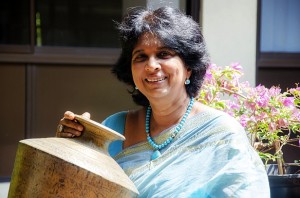To mark International Women’s Day we spoke to two leading lights in the water sector on Women and Water
by Renuka Jeya Raj
Interview with Hon. Dinesh Gunawardena, M.P.
Minister Of Water Supply and Drainage and Chief Government Whip of Parliament
Interview with Kusum Athukorale,
What are the challenges faced by women in the water sector in Sri Lanka?
 I would say that attitudes are a major barrier. Sri Lanka carries a host of historical baggage which confines our women to a conservative gender role, despite the giant strides they have made in contributions to the economy.
I would say that attitudes are a major barrier. Sri Lanka carries a host of historical baggage which confines our women to a conservative gender role, despite the giant strides they have made in contributions to the economy.
Today, women are 52.3 % of the population and head about 23% of households. But they are the foot soldiers of the water sector, both in irrigation and domestic rural water supply. Women’s contribution is significant when it comes to setting up community water organizations, but the leadership rests mostly with men at decision making levels in water- related bodies such as CBOs or farmer organizations. At community level, women who come forward as leaders often face challenges, both in the organization and at home. NetWwater recently facilitated two women CBO leaders to speak at the ‘From the Shallows to Deep – Who takes the lead? Women, Water and Leadership’ conference.
Both these women made very down-to-earth presentations on the issues and challenges facing community women leaders. During the implementation of the project, the women were very energetically involved in their desperation to get water, even breaking traditional gender ideology by trekking through forests, doing manual work on the construction sites. They support the CBOs because they realize how difficult life would be without water, but often got minimal support for such non- domestic activities from their homes. They spoke of malicious slander that caused problems at home, and compelled some women colleagues to leave the project. They spoke of sabotage – water lines damaged, files burnt, experienced by women CBO leaders. In many cases, women in communities are very keen to get involved and are usually good on matters of financial probity. The lady from Kandy said she became unpopular with some of her male colleagues because she was seen as blocking the men from misusing CBO funds. The lady from Kegalle faced negative reactions from village men when she first started working; they told her, “these are not things women can do. They had better stay at home.”
Despite such opposition, many brave women continue to make small but locally significant contributions to the water sector. For example, a woman and her four daughters in the North Central Province built a small anicut which irrigates 17 acres of crops.
But I’m happy to say that women professionals in the mainstream water sector have made great strides. We now have a woman heading the department of Irrigation and another heading the Irrigation Management Division of the Ministry of Irrigation and Water Resources Management.
The issues in the water sector in Sri Lanka are so immense and so grave that it takes both men and women, working in cooperation with each, to find solutions to overcome them.
What, in your opinion, are the policies that should be introduced to improve local women’s access to water?
We should have policies that promote gender de-segregated data collection at every level of community water management, and support decision making based on an accurate picture of rural ground realities. For this, there must be links between water- related ministries and the ministry of women’s affairs.
Capacity – building and leadership for women is also vital. This must be specifically tailored to women’s felt needs and must take into consideration their domestic responsibilities. Capacity building for community women based on accurate needs assessments must also be inputted in ministerial and agency programs.
Empowering women in the water sector is simply about ensuring sustainable development through enhanced efficiency and greater equity.
Kusum Athukorala is Chair of NetWater and the Sri Lanka Water Partnership. She works in communities with private sector partners, ministries and non governmental agencies to promote sustainable development and water management, nationally, regionally and internationally. She received the ‘Women in Water 2012’ award from the International Water Association (IWA) in recognition of her long association with, and deep commitment to, gender-related issues in water.
Renuka Jeya Raj is Communications Specialist/Writer at IWMI

